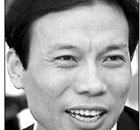Photo
French firm helps China plan harmonious urban landscape
By Han Tianyang (China Daily)
Updated: 2010-04-30 08:07
 |
Large Medium Small |
When modernization and globalization drive societies forward, people have to keep the historical memory and unique feature of their own city at the same time, he said.
"When we designed the Capital Museum, our idea was to build an international and contemporary museum while representing the characteristics of Beijing."
"We adopted the layout of a traditional royal building and used local materials, but the technique is modern."
According to Duthilleul, sustainability is also among the agenda of urban planners, "cities have to be eco-friendly and energy-saving." Problems include how to reuse the wastewater, how to purify the air with green plants, as well as how to make use of solar power by special construction materials, he added.
The sustainable and eco-friendly ideas have already been applied in many buildings in France, and we hope to have opportunities to bring them here to China, he said.
This time Duthilleul came to China to visit the Shanghai World Expo as a member of French President Sarkozy's delegation. "Of course what I want to see most is the Chinese Pavilion," he said with a big smile.
He thinks the World Expo provides a great opportunity for people across the globe to think about the future of their cities.
He also believes that cooperation is a good way for city planners and managers to share their experience. He noted that several cities in France and China have established friendly relationships as sister cities, including Shanghai and Marseilles, Chengdu and Montpellier, Chongqing and Toulouse.
Duthilleul also offered some suggestions for Chinese city planners to help avoid problems, based on his experience in France.
In the future, China will build thousands of kilometers of subway and lots of underground projects, the planners should try to make the natural light reach the underground space no matter how deep it is, he said.
"The method is simple, just dig a hole with diameter of 10 m, and the natural light can come in," he said.
"Once the natural light comes, it will change people's feeling when traveling underground," Duthilleul said, as he believes that high quality public space should make people feel happy.
In the past decade, AREP undertook several projects in China, especially transportation-linked programs, including the South Shanghai Railway Station and Xizhimen transportation hub in Beijing.
Now, the company is constructing the railway station in Qingdao, as well as complex buildings above subways in Hangzhou and Shenzhen.

(China Daily 04/30/2010 page19)







